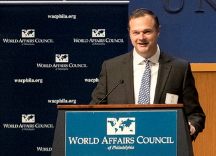When it comes to practicing corporate social responsibility (CSR), financial services company (and new Satell Institute member) JP Morgan actively demonstrates their support by budgeting $1.75 billion globally to deploy over the next five years in communities they serve. They even have their own internal CSR team solely dedicated to managing these efforts, and their philanthropic goals are intrinsically linked to their corporate ones. We spoke with John Emery, Managing Director and Chairman of JP Morgan’s corporate leadership team in Philadelphia, to hear about the evolution of their CSR work.
Let’s get right to it – JP Morgan has plenty of talent and resources to distribute their donations, why join the Satell Institute?
Honestly, the Satell Institute is something every company should be engaging with – not only are you able to give back (which we feel companies should be doing anyway), you gain access to this tremendous network of pre-eminent business leaders. Once I went to the Satell Institute CEO Conference and witnessed first-hand the pedigree of companies and executives involved, joining that community and gaining access to that network was a no-brainer.
JP Morgan is known for making smart investments; what’s the ROI with CSR? Have you seen other financial services companies take a more active role in these efforts?
CSR interest varies by company, and JP Morgan is at the forefront among other financial institutions. But I have absolutely noticed a trend in the past few years towards companies engaging more in CSR, which has certainly influenced employee morale in a positive way. When you get up in the morning and think about who you work for, you want to feel good and proud about what your company does for the community. JP Morgan sees our CSR efforts as an extension of our corporate culture. We want people to want to work for us, and that means establishing and practicing a set of shared values, like giving back to those less fortunate.
I do think there is a need for more engagement in the CSR community though, and I’ve been so impressed by what the Satell Institute is doing. Say you’re a family-run business or a smaller company – you might have an interest in CSR, but you’re probably not going to go out and hire a Director of Philanthropy. So, the Satell Institute becomes an invaluable CSR resource where you can engage with other companies and CEOs, get involved and trade ideas. Ed [Satell] and the Board have done a terrific job attracting big names to the organization, and that sort of access to ideas and experience exchange leads to significant benefits.
What kind of benefits?
Client education and employee engagement for starters, but overall, joining the Satell Institute has given us a different point-of-view when it comes to how we think about long-term giving. Through our membership, we’ve had exposure to the thought process that goes into nonprofit work, and their data-driven analytical approach resonates a lot with us on the for-profit corporate side. We see now that committing to a multi-year donation with a nonprofit of our choice is very important, because that frees up the nonprofit to do more long-term planning, which ultimately increases the impact we’re making through our investment. So, it’s a win-win.
What’s next for CSR? What trends do you see happening in the industry and the Philadelphia region in particular? Any challenges?
We think a lot about how we are going to most effectively and holistically support an organization, and feel that it’s crucial for us to consider the entire spectrum of our giving. I want to re-emphasize how multi-year funding helps accomplish that, and think that more companies should adopt that model. There are lots of issues JP Morgan wants to tackle regionally in Chicago, Detroit and DC, but here in our area we’re excited to continue supporting the West Philadelphia Skills initiative, which helps train people to be career-ready. Poverty rates and sustained economic growth are real challenges, and when you invest in your community, you’re investing in future wealth. Anyone involved in CSR needs to identify and choose issues to support that ultimately support the overall community. Because when you do that, it’s all upside.


